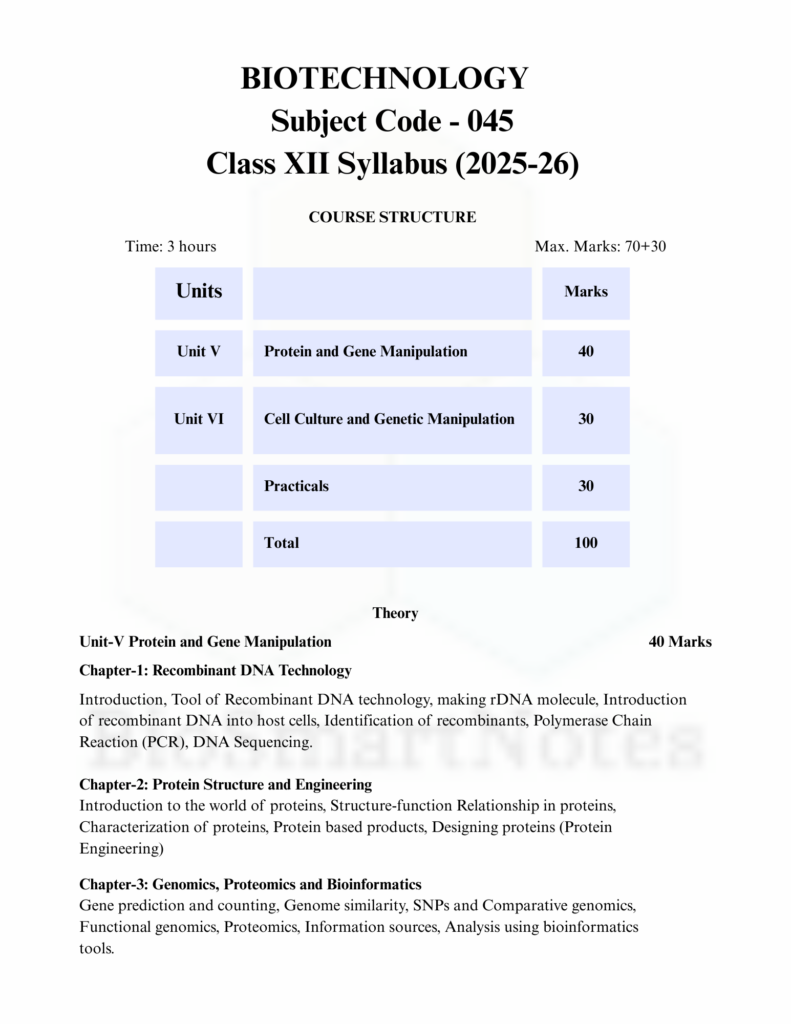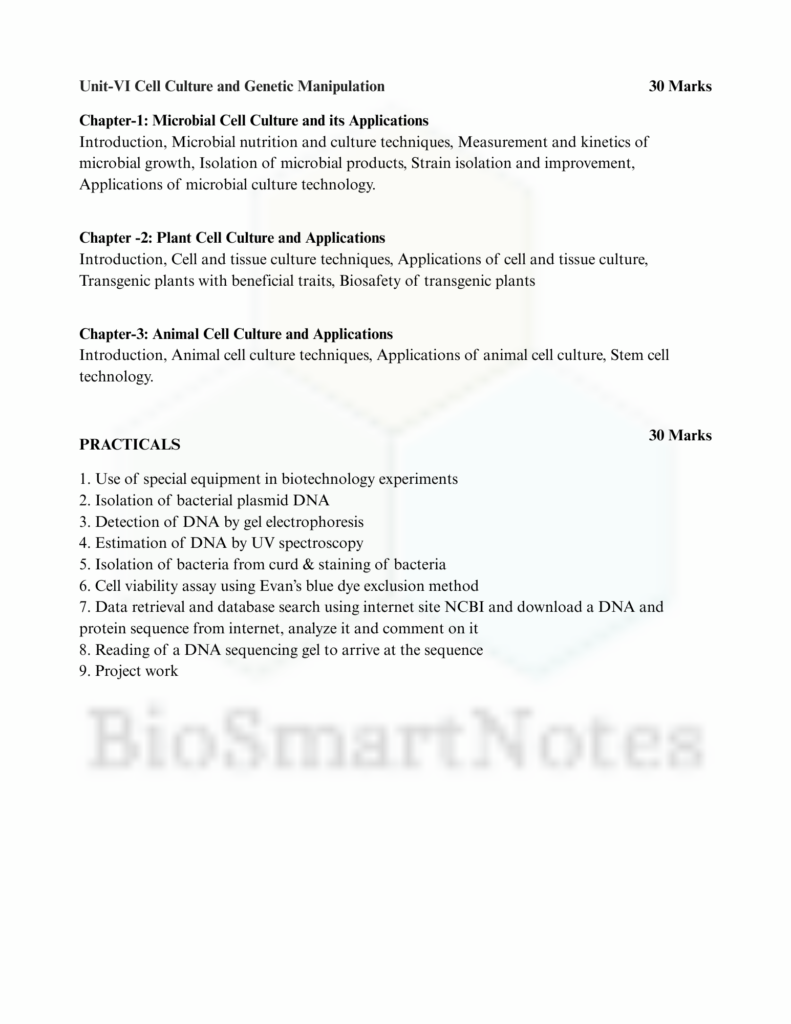If you’ve chosen Biotechnology in Class 12, you’re already exploring one of science’s most exciting and fast-evolving branches. The Class 12 Biotechnology Syllabus 2025-26 is structured to deepen your understanding of molecular biology, genetic engineering, bioinformatics, and more. While the syllabus itself will guide you on what to study, knowing how to approach it is just as important.
This subject blends theoretical knowledge with real-world applications, making it academically rewarding and professionally promising. Whether you’re aiming for a career in research, medicine, pharmaceuticals, agriculture, or environmental science, mastering the biotechnology curriculum in Class 12 lays a strong foundation.
Why Biotechnology Matters in Class 12
Biotechnology is more than just a subject—it’s the gateway to understanding how science can solve real-world problems. From developing life-saving drugs to creating genetically modified crops, biotechnology is shaping the future. In Class 12, the curriculum focuses on refining your understanding of cellular processes, proteins, genetic material, and the tools used to manipulate them.
Unlike some traditional subjects, biotechnology combines biology with technology and hands-on skills. It encourages scientific thinking, creativity, and a practical mindset—all essential for higher education and future career paths.
Approaching the Syllabus: What Students Should Know
The class 12 Biotechnology syllabus 2025-26 is designed to take you deeper into the subject, building on what you learned in Class 11. Topics like protein engineering, bioinformatics, and genetic transformation can be complex at first, but with a structured approach, they become manageable and even enjoyable.
Here are some key points to keep in mind:
- Be Concept-Driven: Understanding the ‘why’ and ‘how’ behind processes is more important than memorizing facts.
- Balance Theory and Practice: Biotechnology involves lab work. Pay attention during practical sessions—they reinforce your theoretical knowledge.
- Use Visual Aids: Diagrams, flowcharts, and tables can simplify complex concepts and help in quick revision.
- Connect the Dots: Try relating concepts from different chapters. For example, understanding DNA structure will help you better grasp genetic engineering techniques.
Class 12 Biotechnology Syllabus 2025-26


How to Prepare for Class 12 Biotechnology Effectively
To make the most of the syllabus and score well on your board exams, follow a smart and consistent study routine. Here’s a student-friendly plan:
1. Start Early and Stay Consistent
Begin your preparation early in the academic year. Break down each unit into smaller sections and cover them one by one. Make sure to revise regularly to retain what you’ve studied.
2. Make Notes
Write your own notes for every topic. Keep them crisp and to the point, especially for definitions, applications, and steps in processes. These notes will be a lifesaver before exams.
3. Master Diagrams and Terminology
Diagrams are an important part of your answers. Practice drawing them neatly and labeling them properly. Also, get familiar with biotechnology-specific terms and use them correctly in your answers.
4. Solve Sample Papers
Once you’ve covered most of the syllabus, start solving previous years’ question papers and sample papers. This gives you a good idea of the exam pattern and helps build confidence.
5. Understand Practical Work
Don’t ignore the practical component. Know how each experiment is performed and what the expected outcomes are. Your practical exam carries significant weight and can boost your overall score.
6. Use Digital Resources Wisely
If a concept feels too complicated, watch animations or video tutorials online. There are many great resources available that explain biotechnology concepts in an interactive and easy-to-understand way.
Project Work and Internal Assessment
The syllabus usually includes project work, which is your opportunity to explore an area of biotechnology that interests you. Choose your topic wisely—pick something relevant, current, and not too broad. A well-researched project can earn you high marks and enhance your understanding of the subject.
Use credible sources, present your information in a clear and well-structured format, and be prepared to answer questions about your project during the viva.
Final Tips for Scoring High in Biotechnology
- Clarity is key – Whether in short or long answers, write clearly and to the point. Use scientific language and proper formatting.
- Revise definitions and processes regularly – These are often asked directly in exams.
- Stick to the syllabus – Don’t waste time on irrelevant details. Focus on what’s prescribed.
- Group study can help – Explaining concepts to peers or studying together can reinforce your understanding.
- Stay updated – Biotechnology is a dynamic field. Occasionally read up on real-world applications to stay motivated and curious.
Conclusion
Biotechnology in Class 12 isn’t just about scoring well on exams—it’s about building a mindset geared toward innovation and problem-solving. The CBSE Class 12 Biotechnology Syllabus 2025-26 offers the perfect mix of academic knowledge and practical skills. With the right strategy and consistent effort, you can master this subject and open doors to a bright and promising future in science and research.
Stay curious, stay consistent, and let biotechnology be your stepping stone to exciting opportunities ahead.
Additional Study Materials
- Class 12 Biotechnology PYQ 2024
- Class 12 Biotechnology PYQ 2023 Solved
- Class 12 Biotechnology PYQ 2022 Solved
- Class 12 Biotechnology PYQ 2020 Solved
- Class 12 Biotechnology PYQ 2019 Solved
- Class 12 Biotechnology PYQ 2018 Solved



